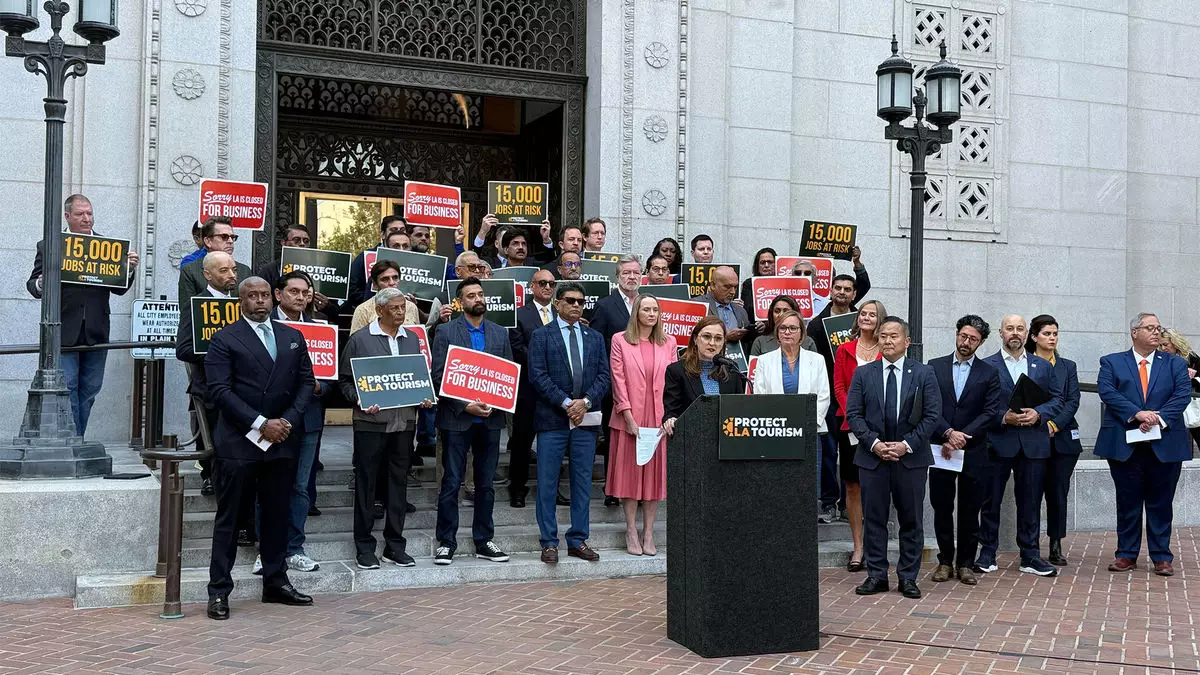In the bustling metropolis of Los Angeles, a contentious debate has erupted over a proposed $30 minimum wage for tourism workers, igniting tensions between industry stakeholders and labor advocates. The proposed measure, referred to as the “Olympic Wage Ordinance,” aims to incrementally raise the minimum wage for hotel employees and airport workers by 2028, coinciding with the much-anticipated Los Angeles Olympics. However, this forward-thinking initiative has faced fierce opposition from hoteliers, who argue that such an increase could decimate the city’s fragile tourism industry, still grappling with the aftereffects of the COVID-19 pandemic and devastating wildfires.
On April 29, a coalition of tourism stakeholders gathered at Los Angeles City Hall to voice their concerns, emphasizing that the proposed wage hike is not only steep but unsustainable in the current economic climate. Councilmember Traci Park articulated the sentiment of many, declaring the impending increase as “unprecedented,” warning of potential operating costs rising by as much as 69% within a mere 60 days. Such alarming statistics have led to fears of significant job losses, with an American Hotel & Lodging Association report predicting the potential elimination of around 14,000 hotel jobs and a staggering $169 million loss in tax revenue.
The Economic Implications of Wage Increases
These stark predictions forcefully illustrate the precarious balance between providing fair wages and preserving the financial health of the tourism sector—a key pillar of Los Angeles’ economy. Critics point to the broader implications of the ordinance, suggesting that the city’s unemployment could spike and discourage vital investments in hotel construction. In a city that ranks low in post-pandemic tourism recovery, where occupancy rates still lag behind pre-pandemic levels, an increase in wage costs could exacerbate an already fragile situation, with business owners feeling squeezed from all sides.
Maria Salinas, CEO of the Los Angeles Area Chamber of Commerce, has expressed a nuanced view on this issue, asserting that while a living wage is essential, the current climate makes such an increase unfeasible. This perspective is not merely about numbers; it’s about survival in a sector still in recovery. The recent wildfires further compounded the challenges faced by hoteliers, with many citing January as a particularly disastrous month for business. The damage inflicted by these disasters has only worsened the precarious state of the industry.
Voices for Change: Labor’s Perspective
Conversely, labor organizations supporting the wage increase highlight a critical dimension often overlooked in these economic discussions: the plight of workers. Advocates argue passionately that a living wage is integral not only for survival but also for economic stability in Los Angeles. Kurt Petersen, co-president of Unite Here Local 11, champions the ordinance as a lifeline for workers struggling to afford housing in one of the most expensive cities in the United States. In his view, raising wages for tourism workers is a means to empower families while simultaneously invigorating the local economy—a win-win scenario.
Supporters argue that ensuring a living wage isn’t just about the workers; it’s about the community that thrives on their labor and patronage. They posit that the Olympic and Paralympic Games present an unparalleled opportunity to uplift hardworking Angelenos and tangibly benefit from a robust tourism sector. Advocates like Petersen see this moment as critical for shifting the narrative around wage discussions—turning the focus from corporate profit margins to community welfare.
The Uneven Playing Field in Tourism Recovery
As the conversation continues, it is essential to recognize that Los Angeles continues to lag behind many other major U.S. tourist destinations in terms of recovery post-pandemic. With the city posting a modest 95% recovery rate in room demand and a significant decline in international visitors, the tourism sector is fraught with uncertainty. Recent statistics indicate that some of the top U.S. hotel markets have rebounded much more effectively, achieving recovery rates between 110% and 145% of 2019 levels. The tourism landscape is becoming increasingly competitive, and the economic pressures facing the industry are amplified by the diminishing returns on international visitation.
Adding to the complexity is the recent downturn in air travel into LAX, which has fallen dramatically from pre-pandemic figures. This stark reality raises questions about the future growth of the tourism sector and its workers’ livelihoods. With projections for international arrivals remaining bleak, the safety net for workers becomes ever more critical, establishing a direct link between fair wages and a thriving economy.
The debate surrounding the $30 minimum wage for tourism workers in Los Angeles underscores the depth and complexity of modern labor issues. As both sides of the argument present valid points, the challenge remains: finding a balanced approach that protects workers’ rights while fostering a vibrant tourism industry capable of withstanding economic fluctuations. The dialogue is ongoing, and its resolution will determine the future landscape of labor rights in Los Angeles.


Leave a Reply